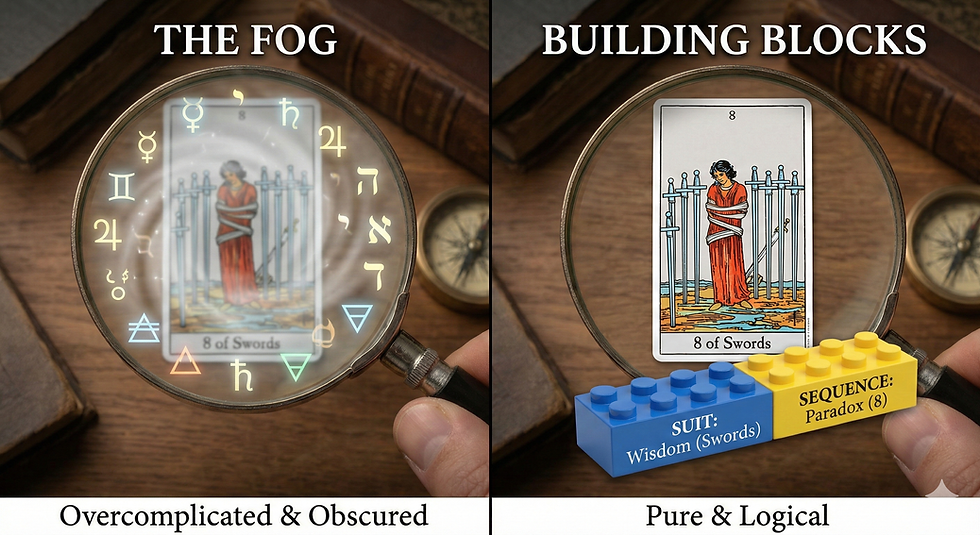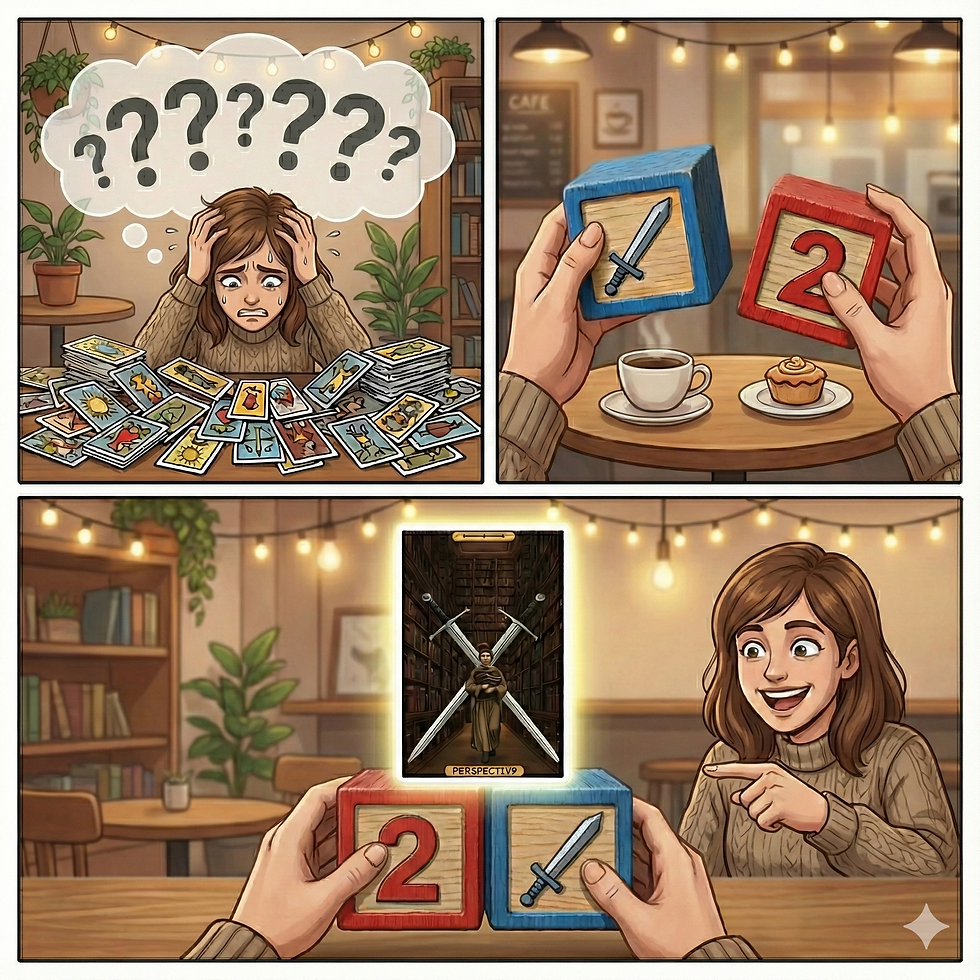Coaxing the Tarot to Talk
- Dr.T
- Aug 28, 2021
- 5 min read

Garbage in, Garbage out
Or, more (im)precisely; Vague fluffy questions result in vague fluffy answers.
If the goal is to Talk with Tarot and to gain useful guidance then a clear and concise question, free from vagueness and ambiguity, is an essential first step.
Thoughtful questions produce clear answers. Imprecise questions produce vague answers. Your degree of success with Tarot as a creativity tool hinges on developing effective questions. - Mark Elroy
Not everyone is going to agree. I can feel the counter along the lines of: "Yes, but sometimes you just want to ask 'what do I need to know today?' You can't always be precise!"
That's fine to a point but it means the reader is going to have to do a lot of extra, unnecessary work to interpret the cards. The probability of misinterpreting the answer (or missing it altogether) is amplified. Consider what you mean by the question... Is it:
What do I need to know today about...? (the context)
What do I need to know today that is affecting me immediately / affecting me long term?
What do I need to know today in order to...
be happy?
promote my business?
avoid stress?
be successful?
Would the answer be the same for each of these questions? Is there a conflict? The action most likely to make you happy might not be the action that promotes your business, and being successful might necessitate stress.
I'm going out on a limb here. IMHO it is always better to have a precise question! Further, if reading for others, helping them define that question is essential (though there is, potentially, a sneaky way around that which I'll cover later).
Good Questions
A good question will:
Be clear and concise
Be free of ambiguity and vagueness
Be specific (context and scope)
Be answerable
and, Focus on you
Clear and concise: Good questions are usually fairly short. Reduce the question to just what is needed to paint a clear picture but not so short that the context is lost. It should be both (a) easy to hold the question in mind, and (b) to recognise an answer to that specific question.
Free of ambiguity and vagueness: This is a big one. Avoid using words in your question that could have multiple meanings. For example:
Don't ask 'What is the best course of action to ...?'
'Best' is vague (at best). Do you mean 'what course of action will bring me the most happiness?' or, 'what course of action will bring about success?' Or, do you hold some other personal definition of best?
Be specific: Be as specific as possible about the context. If the question is about some specific area of a relationship or business then phrase the question to make that clear. For example:
'What course of action will result in my business being successful?' has a very wide scope.
Different actions may result in different successes across different areas of your business (this question would also fail Point 4 as the question is unlikely to be answerable). The narrower the scope the greater the potential for useful guidance. Perhaps you are interested in promoting/advertising your business in which case the question could be narrowed to:
'What course of action will result in the successful promotion of my business?'
The scope could be reduced even further, but hopefully the basic principle is shining through.
Be answerable: This should go without saying but it often needs shouting. Try and answer your own question. What would a good type of answer look like? If you can't think of one the question probably needs work. Similarly (unless you are throwing free-will out the window) don't expect the Tarot to answer questions about the winning lotto numbers.
As a rule of thumb; if someone asked you a question similar to the one you are posing and you can't answer (without getting vague and fluffy), then go back to the drawing board.
Focus on you: It's unlikely you have control over much beyond yourself. Questions like 'What can I do?', 'What should I do?' are more likely to produce useful results than general questions about a situation. For example:
'What can I do to have a happier relationship with ...?'
is preferable to:
'What would result in a happier relationship with ...?'
The second phrasing might suggest a change in the other person which is something you have little, if any control over.
The Catch 22
If you are really unsure about the format of your question then one way (I said sneaky) around this is to use the Tarot to formulate the question. That is, start with small defining questions and slowly build towards an answer. You might begin by asking the Tarot 'Which area of my life do I need to look at?' (scope) and drawing one or two cards. Then ask,'What area within that?' (if the scope need reducing further). A slow process but very meditative and, as the questions and answers intertwine, you will have built both a well-defined question and the guidance/answer to that question.
Designing the Spread
Just when you thought it was safe to start asking those well-defined questions
It's not enough to have a well-defined question unless the spread has the capacity to provide an answer. In this regard I think it is important to be very clear about what every card position relates to before you lay it. I don't think it matters (at all) where you lay the cards as long as you very specifically predefine what you are doing, and why. For example, we (Talk with Tarot) designed a spread for looking at problems/difficult situations. We decided that 6 cards would be sufficient to provide an answer and that the cards, laid in 2 rows of 3, would relate to:

The Housewives Tarot (Paul Kepple & Jude Buffum)
Row 1: Card 1 What do I need to change now?
Row 1: Card 2 How do I make the change now?
Row 1: Card 3 What will be the immediate outcome of that change?
Row 2: Card 1 What do I need to change over time?
Row 2: Card 2 How do I make the change over time?
Row 2: Card 3 What will be the long term outcome of that change?
This allows Talk with Tarot to directly address 'problem' type question in terms of what the querent needs to change, can change, and what the likely outcomes of those changes will be. Whatever your question, it is important to ensure the use of a spread designed to give a clear answer to your question.
As John F. Kennedy clearly did not say:
"Ask not what your question can do for you,
- ask what you can do for your question"
References:
Elroy, M. (2004) Putting the Tarot to Work: Creative Problem Solving, Effective Decision Making & Personal Career Planning. Llewellyn Publications
Kepple P. & Buffum, J. The Housewives Tarot. quirkbook.com
United Feature Syndicate (2001), Dilbert. www.dilbert.com, scottadams@aol.com




Comments